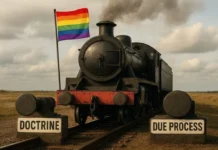Seven-year-olds will be eligible for referral to NHS England’s new service for gender-confused children and young people, it has been reported.
Under health service plans seen by The Daily Telegraph, children as young as seven are to be considered mature enough for specialist treatment for gender dysphoria.
In 2016, it emerged that children as young as three were being sent to the Tavistock and Portman NHS Foundation Trust’s Gender Identity Development Service (GIDS) for ‘transitioning’.
NHS guidance
The controversial Tavistock clinic is due to close next year and be replaced by two regional hubs which will operate under interim guidance informed by findings from the Cass Review on GIDS clinical practice.
According to The Telegraph, the plans suggest that seven-year-olds have a sufficient understanding of “sex and gender” to grasp “the reasons for, and potential consequences of, a referral to a specialist gender incongruence service”.
They also claim that by the age of seven, children will “be more established within school, and education professionals and school nurses will be able to contribute to a general observational view as to the appropriateness of a referral”.
Inappropriate
But Tavistock trust whistleblower Dr David Bell said referrals at such a young age risked “the child’s difficulties being viewed by themselves and their family as primarily to do with gender.
“Labelling the problem as a gender problem can easily be the first step on a pathway to medical transition.”
Dr Bell argued that it is “much more appropriate” that children at younger ages should “be seen as individuals who are distressed” and managed by Child and Adolescent Mental Health Services.
‘Sex matters’
A recent poll by Survation for policy analysis group Murray Blackburn Mackenzie (MBM) has shown that there is considerable confusion over the meaning of expressions commonly used to refer to people who claim to be transgender.
Survation conducted two online panel surveys of more than 1,000 UK adults in June. Over a third of people surveyed did not understand that the terms ‘transgender woman’/’trans woman’ referred to biological males who identified as women.
Lisa Mackenzie, one of MBM’s founders, said: “Using these terms, without spelling out what they mean for a person’s sex as matter of course, will leave a large minority of people at best uncertain.”
She added, these results show “that to avoid confusion and misunderstanding, journalists and others need to spell out clearly what sex of person is being referred to, in any context where sex matters”.



